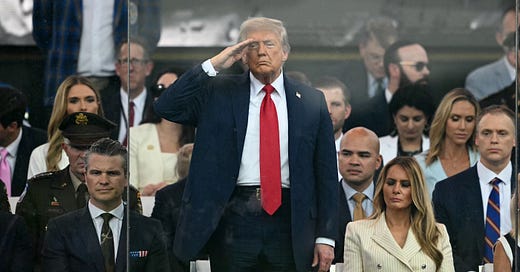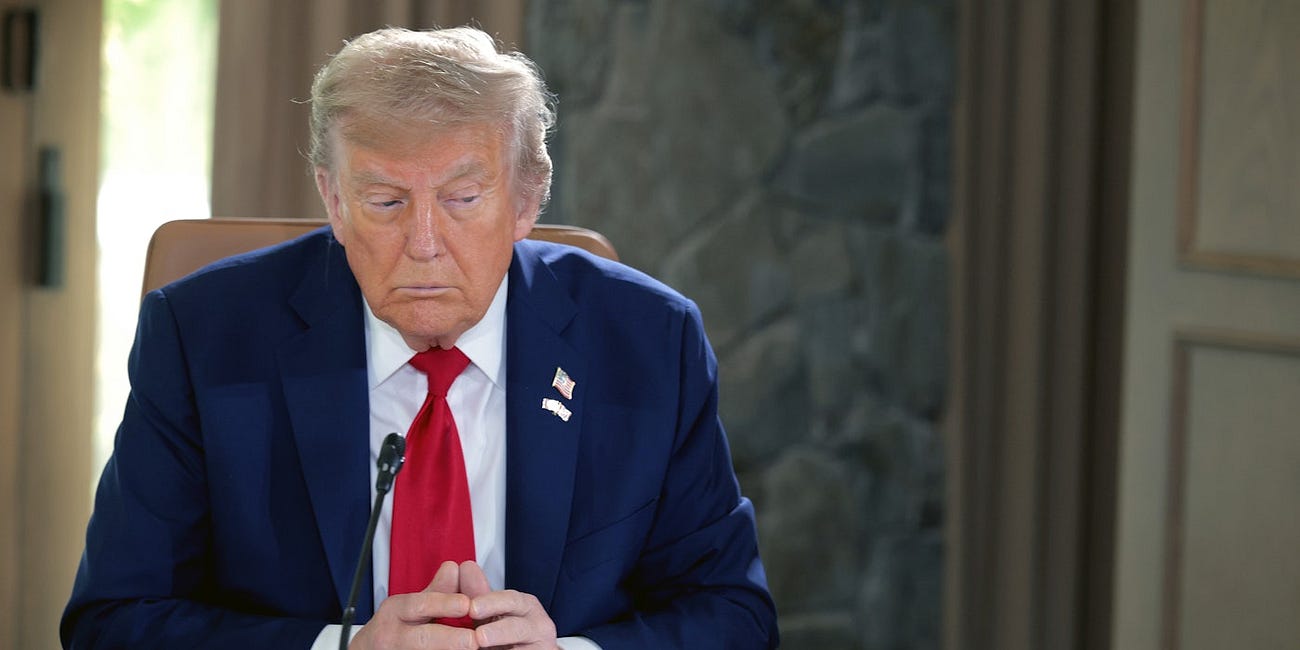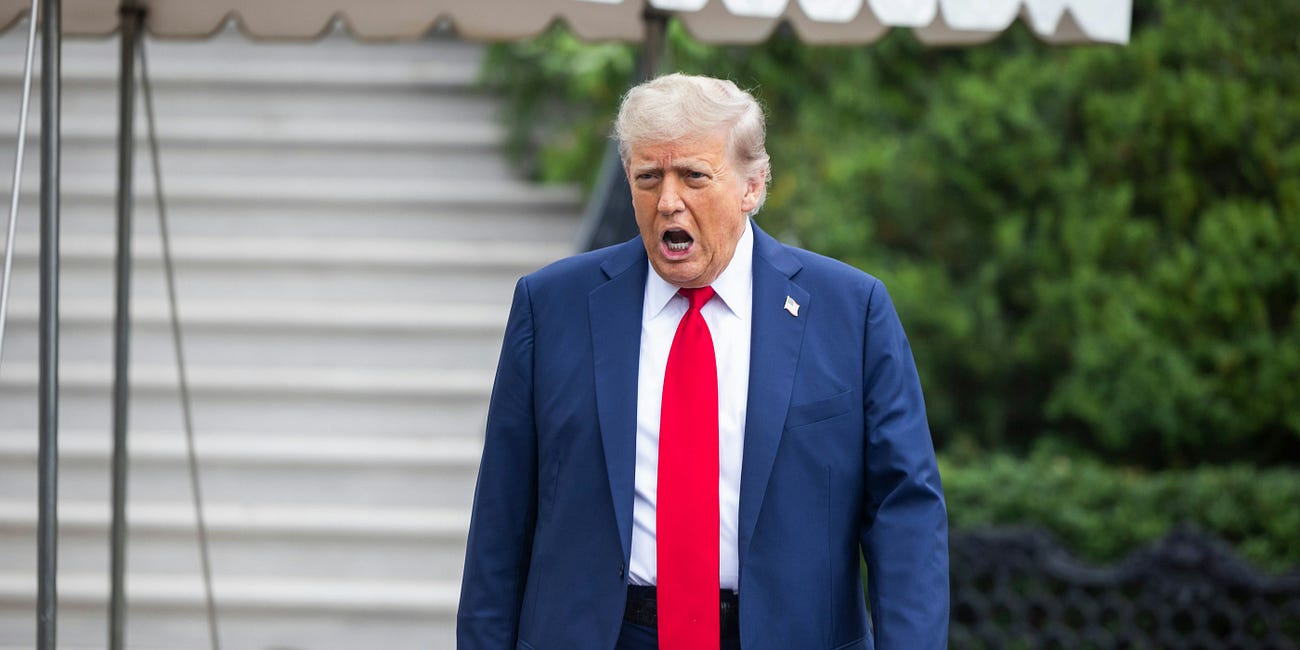Is Trump About to Get His Own Iraq War?
Though portrayed as an anti-interventionist, he has no problem with war—as long as America gets something in return. Now he’s on the cusp of entangling the U.S. military in a conflict with Iran.
In 2016, two months before he was first elected president, Donald Trump identified the real problem with America’s invasion of Iraq. It wasn’t that it caused hundreds of thousands of deaths, destabilized the Middle East, and did nothing to make the United States safer. The real problem, he said during a candidate forum alongside Hillary Clinton, was that the U.S. footed the bill and got zero return on its investment. “We go in, we spend $3 trillion, we lose thousands and thousands of lives, and then ... what happens is we get nothing,” he said. “You know, it used to be to the victor belong the spoils.… I always said take the oil.”
At the time, despite such remarks, Trump was held aloft by critics of U.S. foreign policy across the political spectrum as the anti-interventionist candidate, a conclusion based largely on Trump’s laments about America’s misadventures abroad. But he was not a dove then, and he certainly isn’t one now, despite his (hollow) boasts that he would end the wars in Ukraine and Gaza. Instead, as president, he has repeatedly advocated for and used military power and profoundly increased the risk of serious conflict. In his first term, he was lucky to avoid a war. Five months into his second, as Israel and Iran bombard each other, he is on the verge of dragging the U.S. into a war that could prove even more catastrophic than Iraq.
The common misunderstanding of Trump’s foreign policy emerged during the 2016 election, when his criticism of the Iraq War was central to his campaign for the Republican nomination and the presidency, particularly in contrast to the hawkish Hillary Clinton, who had been a cheerleader for that disastrous war. Trump did, to be fair, stand out in the Republican field for his scathing criticism of the handling of the war, but he was being more than a little opportunistic: His primary rival for the nomination was Jeb Bush, brother of George W. Bush. In fact, Trump had initially supported the war in the early 2000s. Even when he suggested he was against it, as he did in that September 2016 forum, it was often mixed with a contradictory idea: that the U.S. would have been more successful if it had been more rapacious, violent, and imperialistic.
Trump’s foreign policy is grounded in that contradiction: He is against long-standing foreign entanglements but not particularly antiwar—as long as the U.S. emerges as the clear victor. He believes that conflict should involve overwhelming, short-term force and then rapid de-escalation, usually while extracting as many resources and other benefits as possible. It is this impulse that makes his current approach to Iran—which he is simultaneously threatening with destruction and promising peace toward—so frightening. He earnestly believes he can win a swift “unconditional surrender” and not get our military bogged down in an Iraq-like quagmire. And he believes that simply because he is the commander in chief, not those losers who oversaw past military disasters.
Adherents of Trump’s supposed dovishness can rightly point to his many statements decrying global conflict—particularly conflicts, like the wars in Ukraine and Gaza, that began while Joe Biden was president—and his elevation of noninterventionists, notably Tulsi Gabbard, the former Democrat who is his director of national security, and Vice President JD Vance. It would be a mistake to hand-wave their importance, but it’s also abundantly clear that the noninterventionist wing has been completely disempowered. Indeed, Trump’s embrace of conservatives is as opportunistic as ever: Embracing anti-interventionists is part of his larger war on a foreign policy establishment that has viewed him as a buffoon or a threat, but he is quick to cast his erstwhile allies aside in times of conflict and crisis.
On Tuesday, Trump said he “didn’t care” that Gabbard had said—correctly—that U.S. intelligence had found no evidence that Iran was working to complete a nuclear bomb, let alone that it was imminent. Instead, he had clearly decided to accept the Israeli conclusion that Iran was days away from having a nuke, even though it has presented little evidence publicly to that effect and has been saying so for decades. Vance, meanwhile, posted a long, squishy note on Twitter basically disavowing all of his previous statements against intervention and said that Trump had “earned some trust” to go to war, whatever that means.
Whatever Vance and Gabbard’s influence may be, Trump has always been surrounded by interventionists and neocons and they have almost always won out. During his first term, he aggressively increased drone and bombing campaigns in the Middle East and risked launching a regional war by assassinating Qassem Soleimani, the head of Iran’s Revolutionary Guard’s Quds Force, in 2020. His administration readily bombed and attacked foreign countries. The one constant wasn’t peace but simply an aversion to lengthy conflict and regime change. It’s clear that Trump thinks he can do the former without getting bogged down in the latter. In Iran, that theory is facing its ultimate test, and it seems highly unlikely that he’ll be able to join Israel’s attack on the country and somehow not have to deal with the aftermath.
And yet, that seems to be exactly what he’s on the brink of doing. Over the last few days, Trump has continued to insist that he can make a deal with Iran even as it has become far more likely that the U.S. will join the war. The New York Times reported Tuesday that five days since Israel began bombing Iran, “Trump’s posture continues to gyrate. The administration at first distanced itself from the strikes, then grew more publicly supportive as Israel’s initial military success became evident. Now Mr. Trump is seriously considering sending American aircraft in to help refuel Israeli combat jets and to try to take out Iran’s deep-underground nuclear site at Fordo with 30,000-pound bombs.”
Only America’s “bunker-buster” bombs stand a chance of penetrating the underground site, and only an American bomber is capable of carrying them. But were the U.S. to drop such a bomb, Iran almost certainly would take aim at U.S. bases in the region, as it is preparing to do. If U.S. soldiers are killed in Iranian strikes, does anyone really believe Trump won’t further escalate the war?
The Times noted that bombing Fordo “would mark a stunning turnabout from his opposition just two months ago to any military action while there was still a chance of a diplomatic solution.” But it’s only stunning to those who either still believe Trump is an anti-interventionist or still have not accepted that Trump is a blowhard whose words can never be trusted. The reality is that Trump only ever thinks about himself, and has infinite faith in his ability to win in any conflict (literal or figurative). That’s why he thinks he can simultaneously bomb Iran into oblivion and make a deal with Ayatollah Khamenei that would avert long-standing U.S. military involvement in the region. It is reckless, and it is stupid—exactly the kind of decision that could lead to years of war, costing the U.S. trillions of dollars and causing the loss of thousands and thousands of lives.
But that probably doesn’t concern Trump so much, so long as he gets Iran’s oil.
We Better Pray That No Unexpected Crisis Hits While Trump Is President
If you live in the United States, you are in greater jeopardy today than you were six months ago. So is your family. So are your friends and neighbors.
The Worst Part of Trump’s Big Bill Is Getting Almost No Attention
For many weeks now, Senate Democrats have been trying to home in on the right message against the Republicans’ preposterously titled Big Beautiful Bill. While the budget bill narrowly cleared the House after some false starts, its deficit-busting characteristics have thus far kept it from the unified GOP support i…









Why does Trump have this sudden urge to join with Israel in attacking Iran?
First of all, if Trump commits any of our armed forces to join Israel in their war against Iran, such an act would constitute an impeachable offense as a violation of Article I, Section 8, Clause 11 of the U.S. Constitution which grants Congress the sole power to declare war.
There is one point though that is worth conceding. If anyone knows how to plan an invasion, it's Donald Trump. He had proven this on January 6, 2021 when his MAGA fighters successfully smashed through the doors, windows and other barriers to invade the Capitol building. Victory though was not to be Trump's, as we know.
Which brings us to what's really behind Trump's sudden urge to join Israel in their war against Iran.
For the past 72 hours, the world has been laughing at Donald Trump's pathetic birthday fizzle to himself on Saturday. So who but "a stable genius", after consulting with his brain trust of "Little Marco" Rubio and Pete Hegseth (assuming he was sober at the time), could have come up with the brainstorm of threatening a nuclear war to take everyone's mind off of Trump's thorough humiliation of himself?
Bingo!
Donald Trump has repeatedly called for Iran’s “unconditional surrender” in recent speeches, including remarks at a June 12 rally in Ohio and during a June 17 Fox News interview. He seems to invoke the term with no grasp of its historical or military gravity—evoking World War II-era demands without recognizing the immense costs they entail. In context, he's framing this as strength, saying the U.S. should "take the oil" and end wars with a clear winner, as if he’s waging a personal real estate deal rather than contemplating a conflict with a regional power of 90 million people.
But demanding Iran’s unconditional surrender isn’t just belligerent bluster—it signals a goal that would require total regime collapse, mass military deployment, occupation, and likely a regional war. That’s not just fantasy; it’s delusion. Iran is not Iraq. It has proxy networks, missiles, a hardened military, and economic partners like China and Russia. Forcing surrender would mean bombing deep targets like Fordo and preparing for retaliation that could kill U.S. troops, spike oil prices, and destabilize every U.S. base in the region.
This isn't “peace through strength”—it’s escalation without exit. It's a script for oil shocks, global recession, and potentially tens of thousands of American and Iranian deaths. Trump talks as if wars can be wrapped up like lawsuits—strike a deal, declare victory, and move on. But history, strategy, and the limits of military power don’t work that way. The Iraq disaster was born from hubris and bad faith. Trump seems poised to repeat it, only louder, costlier, and with even less of a plan.